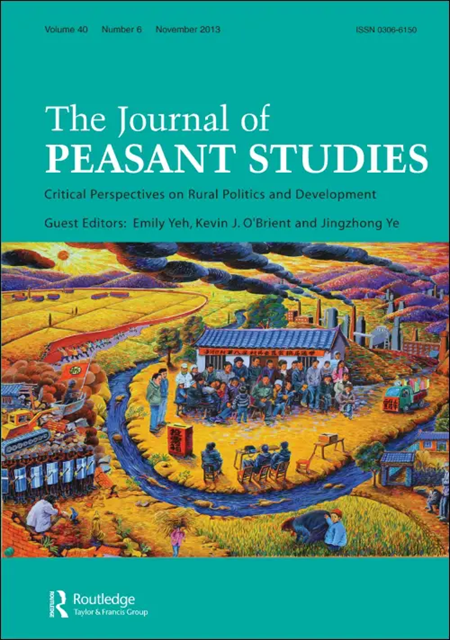Food sovereignty in Ecuador: peasant struggles and the challenge of institutionalization
IF 4.8
1区 社会学
Q1 ANTHROPOLOGY
引用次数: 84
Abstract
The Ecuadorian Constitution (2008) declared food sovereignty a strategic goal and a government obligation, embracing many of the proposals put forth since the late 1990s by Ecuadorian federations linked to Vía Campesina. The issue of food sovereignty has expanded from the inner circles of peasant organizations to the wider context of the whole Ecuadorian society. The paper provides an overview of this process, describing the collective actions that made it possible. Moreover, it attempts to explain the reasons why the ‘Agrarian Revolution’ is currently evaluated as weak, and the motivations for a gap between constitutional mandates and the ongoing official policies.厄瓜多尔的粮食主权:农民斗争和制度化的挑战
厄瓜多尔宪法(2008年)宣布粮食主权是一项战略目标和政府义务,包含了自20世纪90年代末以来与Vía Campesina相关的厄瓜多尔联盟提出的许多建议。粮食主权问题已从农民组织的内部圈子扩大到整个厄瓜多尔社会的更广泛范围。本文概述了这一过程,描述了使之成为可能的集体行动。此外,它试图解释为什么“土地革命”目前被评估为软弱的原因,以及宪法授权与正在进行的官方政策之间存在差距的动机。
本文章由计算机程序翻译,如有差异,请以英文原文为准。
求助全文
约1分钟内获得全文
求助全文
来源期刊

Journal of Peasant Studies
Multiple-
CiteScore
10.50
自引率
17.60%
发文量
99
期刊介绍:
A leading journal in the field of rural politics and development, The Journal of Peasant Studies (JPS) provokes and promotes critical thinking about social structures, institutions, actors and processes of change in and in relation to the rural world. It fosters inquiry into how agrarian power relations between classes and other social groups are created, understood, contested and transformed. JPS pays special attention to questions of ‘agency’ of marginalized groups in agrarian societies, particularly their autonomy and capacity to interpret – and change – their conditions.
 求助内容:
求助内容: 应助结果提醒方式:
应助结果提醒方式:


